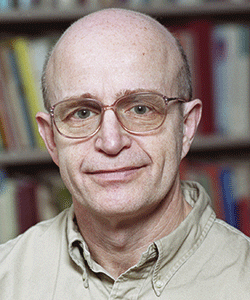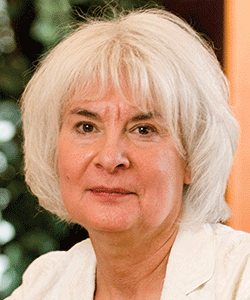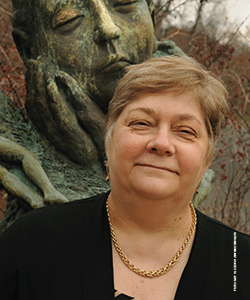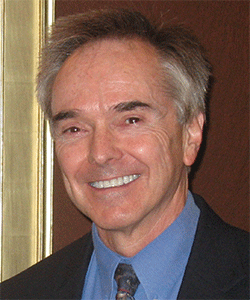Reflecting on Lifetimes of Achievement
As part of APS’s 25th anniversary celebration, the Board of Directors is honoring 25 distinguished scientists who have had a profound impact on the field of psychological science over the past quarter-century. Eight individuals have been selected to receive the James McKeen Cattell Fellow Award, honoring a lifetime of significant contributions to applied psychological research. Seventeen scientists are receiving the William James Fellow Award, which recognizes their significant intellectual contributions to the basic science of psychology. In this issue of the Observer, APS continues the series by profiling four of these eminent scientists. Read about all of the 25th Anniversary award recipients at www.psychologicalscience.org/25at25.

John R. Anderson
Carnegie Mellon University
William James Fellow Award
John Anderson is widely known for his cognitive architecture, ACT-R (Adaptive Control of Thought — Rational), a theory dealing primarily with memory structure. He was also an early leader in research on intelligent tutoring systems (ITS), computer systems that provide immediate and customized instruction or feedback to learners.
ACT-R is described as a way of specifying how the brain itself is organized in a way that enables individual processing modules to produce cognition. Using the ACT-R model, Anderson’s studies have looked at neural processes of people while they are solving complex problems such as algebraic equations. He and colleagues generated a cognitive model that predicted that while students were solving algebraic equations, neuroimages would show increased activation in a number of predefined regions. They further predicted and confirmed that this increase in activation would diminish as students acquired proficiency in solving these problems.
Anderson’s work served as the basis for the development of ITS, which are now being used in both formal education and professional settings. A noteworthy example of his impact is the Pittsburgh Science of Learning Center (PSLC), a joint program of Carnegie Mellon and the University of Pittsburgh. The center uses tutoring software to develop effective new ways of teaching and to gather valuable information about the learning process from students in actual classrooms rather than laboratory environments.
Anderson’s cognitive modeling techniques have profoundly advanced computer-assisted learning in subjects ranging from mathematics to foreign languages.

Photo courtesy of Stanford News Service.
Ellen M. Markman
Stanford University
William James Fellow Award
Ellen Markman’s work has covered a range of issues in cognitive development. She conducted some of the pioneering research on the development of comprehension monitoring in children. Much of her work has addressed questions about the relationship between language and thought in children focusing especially on categorization and inductive reasoning and on how infants and young children figure out the meanings of words.
In particular, Markman addressed the question of how young children solve the inductive problem that word learning poses. Very young children are surrounded by a huge array of objects, all unfamiliar; yet, despite their limited information-processing abilities, children are remarkably capable of categorizing objects and learning object labels. When someone points to an object and labels it, the word could, in principle, refer to the object itself, its color, size, shape, texture, attractiveness, and so on. She contends that in order to learn the meaning of a word, children make use of three basic principles: the whole object assumption (words refer to an object rather than to its parts or features), the taxonomic assumption (labels should be extended to an object of the same kind rather than an object that is thematically related), and the mutual exclusivity assumption (each object has only one label).
In her landmark work on early conceptual and lexical development, Markman has challenged the fundamental assumptions of traditional theories of word learning and provided new insights into the nature of children’s categories.

© Lloyd Wolf / www.lloydwolf.com
Elissa L. Newport
Georgetown University
William James Fellow Award
With a background in cognitive science and now a professor of neurology, Newport has devoted her career to studying human language acquisition and developmental psycholinguistics, with a focus on the relationship between language development and language structure. She studies both normal language acquisition and creolization using miniature languages presented to learners in the lab, where both the input and the structure of the language can be controlled.
A second line of research for Newport concerns maturational effects on language learning. In her less-is-more hypothesis, she posits that children are, paradoxically, better able than adults to learn languages because they have fewer cognitive resources available to them. In contrast, adults try to analyze language using more complex computational abilities and do not as readily find the broad regularities. This provides an explanation for why people who learn a language later in life are generally not as successful as children who learn language early.
Newport also conducts studies of human learners acquiring musical and other nonlinguistic patterns to see similarities and differences in sequential learning across domains.
Her most recent work employs functional MRI to examine how signed and spoken languages are represented in the brain and how language is reorganized after damage or disease. As director of the Center for Brain Plasticity and Recovery, she and her colleagues are using stroke as a model in which to study neuroplasticity and recovery in children and adults. Their aim is to use a deeper understanding of recovery of function in children to enhance recovery in adults.
Newport’s work on developmental plasticity — how learning mechanisms change over age — has not only fostered our understanding of language development, but is also exploring new ways to help adults recover from brain injuries.

John R. Weisz
Harvard University
James McKeen Cattell Fellow Award
John Weisz has committed his scientific career to improving the lives of children and adolescents who have serious emotional and behavioral problems. His research focuses on promoting youth mental health through evidence-based intervention. Through his deployment-focused model and his own research, he has promoted the idea that both interventions and intervention science are enhanced when treatment development and testing are carried out in the clinical care contexts for which the interventions are ultimately intended.
While on the clinical psychology faculty at University of California, Los Angeles, Weisz and his students conducted extensive research on treatment process and outcome in everyday clinical practice. They carried out randomized controlled effectiveness trials of cognitive behavioral therapy for clinically-referred youths struggling with depression and anxiety, with treatment provided by community clinicians trained by his team, based in the clinics where those clinicians were employed.
Weisz’s work at UCLA continued and expanded when he became a professor at Harvard in 2005. As director of Harvard’s Laboratory for Youth Mental Health, his research now encompasses a network of community mental health clinics and schools, with continuing support from the National Institute of Mental Health, the Annie E. Casey Foundation, and the Norlien Foundation.
Weisz’s research team conducts randomized effectiveness trials, developing and testing strategies for implementing evidence-based treatments in clinical and educational settings for children and adolescents. Included in much of this work is a network of colleagues from multiple disciplines — including psychology, pediatrics, anthropology, social work, sociology, and biostatistics — as well policymakers and parents of children who have received mental health services. In addition, an active network of former students — “Weisz Lab Grads” — carries on related projects as faculty members in two dozen universities in the United States and beyond.
The Weisz lab’s treatment development and randomized trials research is complemented by ongoing meta-analyses of the evidence base from hundreds of youth psychotherapy trials. In this series of meta-analyses, Weisz and his colleagues have characterized and critiqued the state of knowledge in the field, proposing numerous ways of strengthening treatments and treatment research.
Through his treatment research and meta-analyses, Weisz serves as a model for clinical researchers. His work brings science and practice together to improve youth mental health care, enriching both the rigor and the relevance of intervention science.
Look for John Weisz’s reflection “Building Robust Psychotherapies for Children and Adolescents” in the January 2014 issue of Perspectives on Psychological Science.





APS regularly opens certain online articles for discussion on our website. Effective February 2021, you must be a logged-in APS member to post comments. By posting a comment, you agree to our Community Guidelines and the display of your profile information, including your name and affiliation. Any opinions, findings, conclusions, or recommendations present in article comments are those of the writers and do not necessarily reflect the views of APS or the article’s author. For more information, please see our Community Guidelines.
Please login with your APS account to comment.